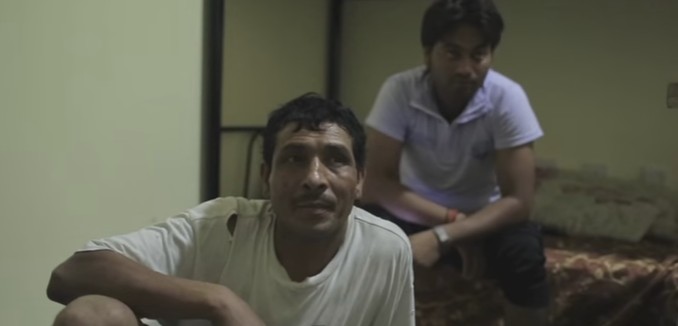FIFA, the governing body of soccer, is being sued for violating the rights of migrant workers in Qatar, where the 2022 World Cup is being hosted, The Guardian reported Monday.
The suit is being brought by the Netherlands Trade Union Confederation on behalf of Bangladeshi migrant worker Nadim Sharaful Alam. While only around $10,000 is being sought in damages, the suit’s success could expose FIFA to suits from hundreds of thousands more migrant workers who are subject to Qatar’s kafala system of employment, which binds the workers to employers and gives them virtually no rights.
A note accompanying the lawsuit, addressed to FIFA president Gianni Infantino, called on the organization to “acknowledge that it has acted wrongfully by awarding the World Cup 2022 to Qatar without demanding the assurance that Qatar observes fundamental human and labour rights vis-à-vis migrant construction workers whose work is related to the 2022 World Cup.”
Qatar’s treatment of its migrant workforce came increased scrutiny last year when it arrested a BBC crew that was investigating working conditions, as well as when it refused to allow Nepalese workers to return home in April 2015 following a devastating earthquake in that country. The Qatari government created a public relations agency to polish its image following those scandals, but no improvement in working conditions has been shown. The International Trades Union Confederation estimated late last year that up to 7,000 migrant workers will die in Qatar before the World Cup begins, based on independently-reported death tolls and the Qatari government’s own figures.
A census report released by Doha in June estimated that nearly 60% of Qatar’s residents live in what the government calls “labour camps.”
An Amnesty International report published in March found many examples of migrant worker abuse in Qatar, including:
* Being forced to live in squalid and cramped accommodation
* Being required to pay large fees ($500 to $4,300) to recruiters in their home country to obtain a job in Qatar
* Being deceived as to the pay or type of work on offer (all but six of the men [interviewed] had salaries lower than promised when they arrived, sometimes by half)
* Not being paid for several months, creating significant financial and emotional pressures on workers already burdened with heavy debts
* Employers not giving or renewing residence permits, leaving people at risk of detention and deportation as “absconded” workers
* Employers confiscating workers’ passports and not issuing exit permits so they could not leave the country
* Being threatened for complaining about their conditions.
In The Fruitful Game: How Qatar Uses Soccer to Polish Its Image, which was published in the October 2014 issue of The Tower Magazine, senior editor Ben Cohen described the depredations that migrant workers are subjected to under kafala.
The most savage of Qatar’s apartheid-esque qualities lies in the treatment of its 1.4 million migrant workers. Over the last two years, reports have repeatedly emerged of barbaric working conditions in the World Cup stadiums under construction, of unsanitary and crowded living quarters, and of the myriad abuses enabled by a labor relations system, known as the kafala, which converts the employer-worker relationship into a master-slave one. A government-issued report admitted that nearly 1,000 South Asian migrant workers died in 2012 and 2013; workers who built the 43-story al-Bidda Tower, which contains the headquarters of Qatar’s World Cup organizing committee, weren’t paid for over 13 months.
A recent Guardian article on the subject opened with a description of Nepali workers leaving for Qatar from Kathmandu’s departures terminal, while over in the arrivals hall, planes coming in from Doha unloaded coffins containing “some of their predecessors…from the cargo hold.” In September, two British human rights researchers investigating the predicament of Nepali workers, Krishna Upadhyaya and Gundev Ghimire, were detained for ten days by the Qatari authorities as they attempted to leave the country. Speaking after his release, Upadhyaya said that he and Ghimere were repeatedly asked “why we were choosing Qatar, and not the other countries. The main thing they were asking was why Qatar, why are you portraying it as a negative picture. They were most concerned about that.”
[Photo: The Guardian / YouTube ]




